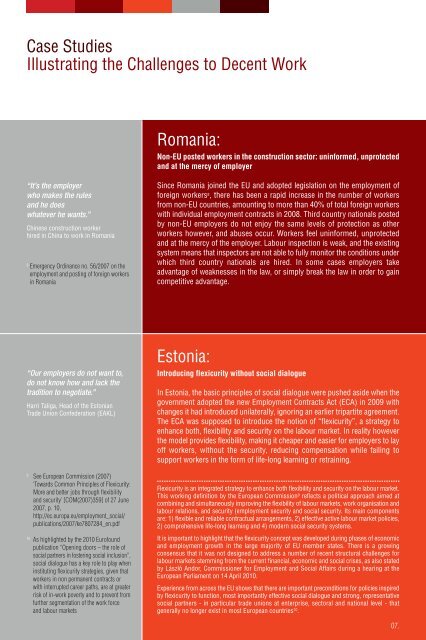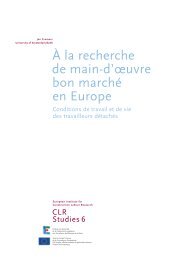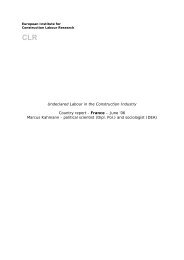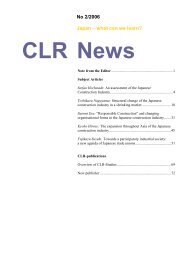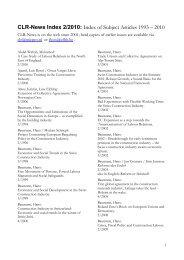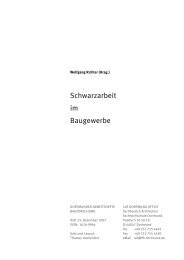SOLIDAR (2010): Social dialogue - Horus.be
SOLIDAR (2010): Social dialogue - Horus.be
SOLIDAR (2010): Social dialogue - Horus.be
You also want an ePaper? Increase the reach of your titles
YUMPU automatically turns print PDFs into web optimized ePapers that Google loves.
Case StudiesIllustrating the Challenges to Decent WorkRomania:Non-EU posted workers in the construction sector: uninformed, unprotectedand at the mercy of employer“It’s the employerwho makes the rulesand he doeswhatever he wants.”Chinese construction workerhired in China to work in Romania8Emergency Ordinance no. 56/2007 on theemployment and posting of foreign workersin RomaniaSince Romania joined the EU and adopted legislation on the employment offoreign workers 8 , there has <strong>be</strong>en a rapid increase in the num<strong>be</strong>r of workersfrom non-EU countries, amounting to more than 40% of total foreign workerswith individual employment contracts in 2008. Third country nationals postedby non-EU employers do not enjoy the same levels of protection as otherworkers however, and abuses occur. Workers feel uninformed, unprotectedand at the mercy of the employer. Labour inspection is weak, and the existingsystem means that inspectors are not able to fully monitor the conditions underwhich third country nationals are hired. In some cases employers takeadvantage of weaknesses in the law, or simply break the law in order to gaincompetitive advantage.“Our employers do not want to,do not know how and lack thetradition to negotiate.”Harri Taliga, Head of the EstonianTrade Union Confederation (EAKL)9See European Commission (2007)‘Towards Common Principles of Flexicurity:More and <strong>be</strong>tter jobs through flexibilityand security’ [COM(2007)359] of 27 June2007, p. 10,http://ec.europa.eu/employment_social/publications/2007/ke7807284_en.pdf10As highlighted by the <strong>2010</strong> Eurofoundpublication “Opening doors – the role ofsocial partners in fostering social inclusion”,social <strong>dialogue</strong> has a key role to play wheninstituting flexicurity strategies, given thatworkers in non permanent contracts orwith interrupted career paths, are at greaterrisk of in-work poverty and to prevent fromfurther segmentation of the work forceand labour marketsEstonia:Introducing flexicurity without social <strong>dialogue</strong>In Estonia, the basic principles of social <strong>dialogue</strong> were pushed aside when thegovernment adopted the new Employment Contracts Act (ECA) in 2009 withchanges it had introduced unilaterally, ignoring an earlier tripartite agreement.The ECA was supposed to introduce the notion of “flexicurity”, a strategy toenhance both, flexibility and security on the labour market. In reality howeverthe model provides flexibility, making it cheaper and easier for employers to layoff workers, without the security, reducing compensation while failing tosupport workers in the form of life-long learning or retraining.Flexicurity is an integrated strategy to enhance both flexibility and security on the labour market.This working definition by the European Commission 9 reflects a political approach aimed atcombining and simultaneously improving the flexibility of labour markets, work organisation andlabour relations, and security (employment security and social security. Its main componentsare: 1) flexible and reliable contractual arrangements, 2) effective active labour market policies,2) comprehensive life-long learning and 4) modern social security systems.It is important to highlight that the flexicurity concept was developed during phases of economicand employment growth in the large majority of EU mem<strong>be</strong>r states. There is a growingconsensus that it was not designed to address a num<strong>be</strong>r of recent structural challenges forlabour markets stemming from the current financial, economic and social crises, as also statedby László Andor, Commissioner for Employment and <strong>Social</strong> Affairs during a hearing at theEuropean Parliament on 14 April <strong>2010</strong>.Experience from across the EU shows that there are important preconditions for policies inspiredby flexicurity to function, most importantly effective social <strong>dialogue</strong> and strong, representativesocial partners - in particular trade unions at enterprise, sectoral and national level - thatgenerally no longer exist in most European countries 10 .07.


